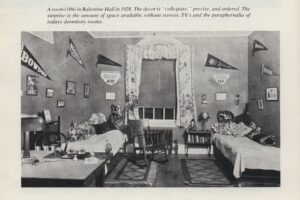Last Thursday, Sept. 21, poet and translator Mark Tardi gave a reading of his work at the University of Maine as part of the New Writing Series.
This one-hour reading started at 4:30 p.m. in the Allen and Sally Fernald Adaptive Presentation APPE space in 104 Stewart Commons. The visiting writer was introduced by Jennifer Moxley, professor of English. Tardi met Moxley when he was a student, during one of her poetry readings in Belgium. She briefly summarized Tardi’s style for the public, sharing that he “works in long sequences, uses citational illusions and utilizes the page in interesting ways.”
Tardi grew up in Chicago and earned his MFA in creative writing from Brown University. His collections of poetry include the chapbooks (a small collection of poetry) “Part First — Chopin’s Feet” (2005) and “Airport Music” (2005), as well as the full length poetry books “Euclid Shudders” (2003) and “Airport Music” (2013). Tardi’s Polish roots influenced his interest in Polish poetry. He has translated works of Polish poets Kacper Bartczak, Miron Białoszewski, Monika Mosiewicz and Przemysław Owczarek. From 2008 to 2009, Tardi was a Fulbright Senior Lecturer in American Literature and Culture at the University of Lodz, where he is currently a faculty member. His newest book, “The Circus of Trust,” was published by Dalkey Archive Press in August 2017.
Tardi started the event by reading some of the translations of Polish poets.
“One of my teachers said that the goal of the translator is to make the work better than the original,” Tardi said. “This is an impossible task. Translators have to make choices, solve problems, just like a writer. Writing in original is a translation of its own, a translation of thoughts and feelings into words.”
Through translations, people get to experience the richness of new emotions and thoughts of other people, no matter where in the world they are.
“A lot of translators are doing hard work, it’s sort of a thankless task that is underappreciated,” Tardi said. “Without translations, many writers wouldn’t have had an audience outside of their home country.”
Despite the skills of a translator, some words and sentences simply can’t convey the same meaning that the original language does.
“There are some words in Polish that are very precise and that have no translation for. In Polish grammar there is flexibility, an almost acrobatic quality of moving words around to achieve a particular effects.”
Tardi agrees that perhaps some translations don’t do justice to the original work.
“If you are able to read in the original, the translation may be imperfect. But I’d rather see these things exist. I’d rather see people read imperfect translation than them being completely invisible.”
Tardi also read a couple of excerpts from his new book “The Circus of Trust.” The underlying message of this book reflects how systems fundamentally undermine themselves. Tardi wrote in the context of technology and human social dynamics.
“I wouldn’t have been able to write ‘The Circus of Trust’ had I still lived in Chicago,” Tardi said. Now he lives in a village in central Poland. He shared in a Q&A that him and his wife get eggs from a Polish neighbor who has 25 chickens. “Living in Poland had an effect on me, it loosened me up. It takes a different kind of effort now, for me to read contemporary poems.”
Poetry is an act of listening, and Tardi’s poems can be and should be listened to, preferably with closed eyes. He is spare with his words. Tardi approaches the words with quiet, calculated precision, making a memorable impression. His poems, though at times gory, are charming and humorous. The following excerpt displays that quite vividly: “We all know, dying in Cleveland is redundant. Impossible, but surely plausible enough.”
The next day Tardi visited the advanced poetry writing class taught by Moxley. His biggest piece of advice to students writing poetry is to read, listen and ask questions.
“When I first heard Jennifer [Moxley] read in Belgium, one of the poems she read I still remember very well. At that point it became really clear that being a writer is a dialogue. You’re engaging in much deeper conversation about the depth of human history,” Tardi said.
The UMaine New Writing Series (NWS) was founded in 1999. All NWS events are held at 4:30 p.m. on Thursday afternoons in the Allen and Sally Fernald APPE Space in 104 Stewart Commons. For the list of speakers visit nwsnews.wordpress.com. All events are free and open to the public.









